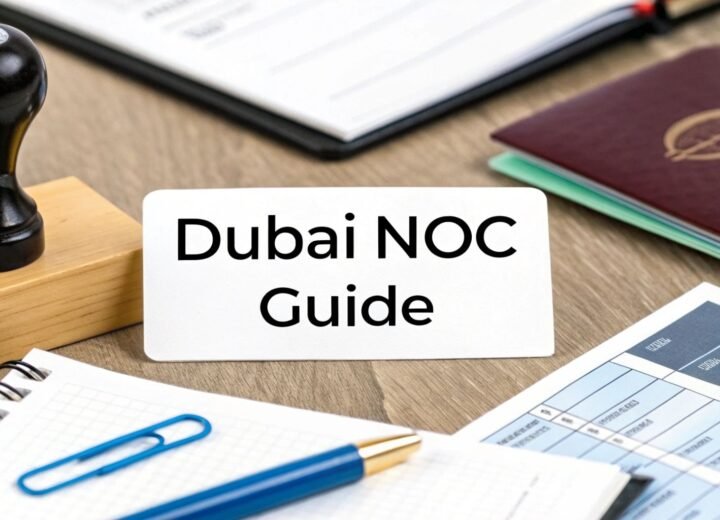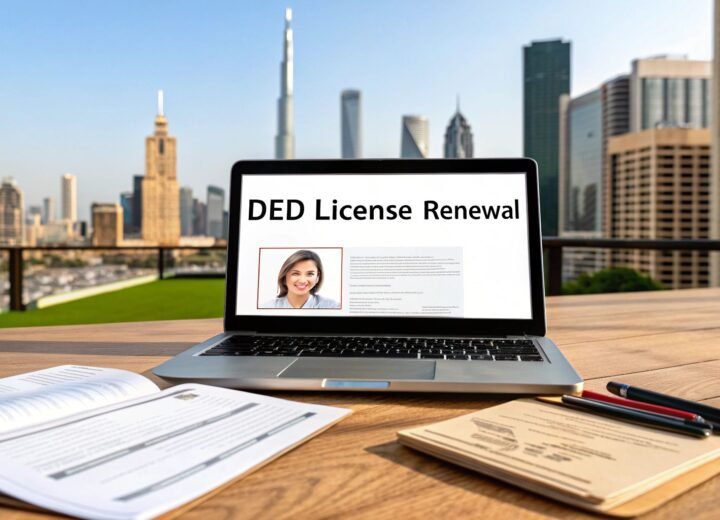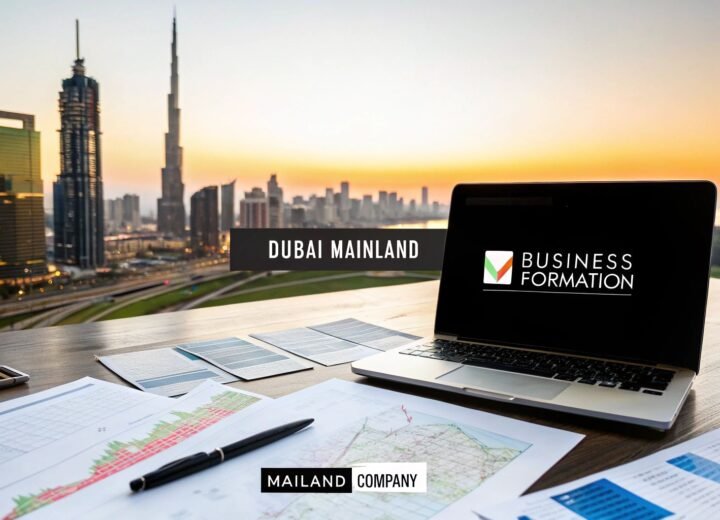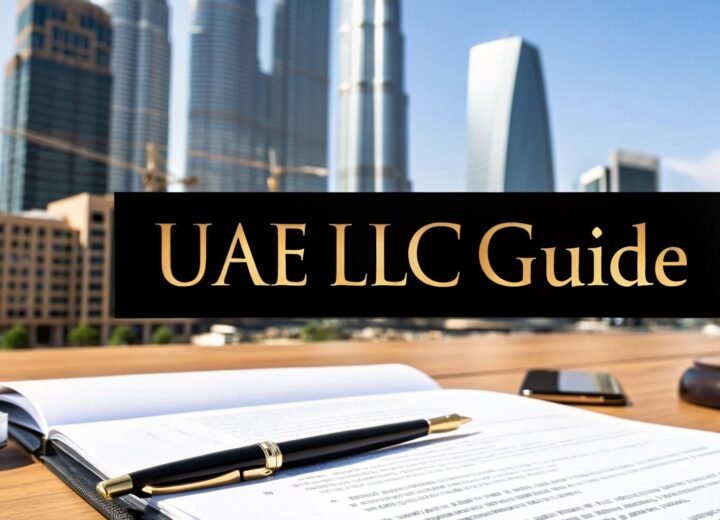Getting a business license in Dubai is the first, most crucial step you'll take when setting up your company. This isn't just a piece of paper; it's the official permit that gives you the legal authority to operate. It clearly defines what your business can do and where you can do it, whether that's on the Mainland or within a specialised Free Zone. Think of it as your key to unlocking Dubai's massive market potential.
So, You're Ready to Launch a Business in Dubai?
That’s a smart move. But it all starts with getting the right license. This guide is designed to be your practical roadmap, cutting through the jargon and complexities of company formation in Dubai.
We’ll jump right into the most critical decision you'll face: choosing between a Mainland and a Free Zone setup. Forget the abstract theory; we're bringing you real-world insights from entrepreneurs who've navigated this exact path. You’ll learn precisely which documents to gather, how to handle the approval process, and what to expect in terms of costs. This is about giving you the foundation to make confident, informed decisions from day one.
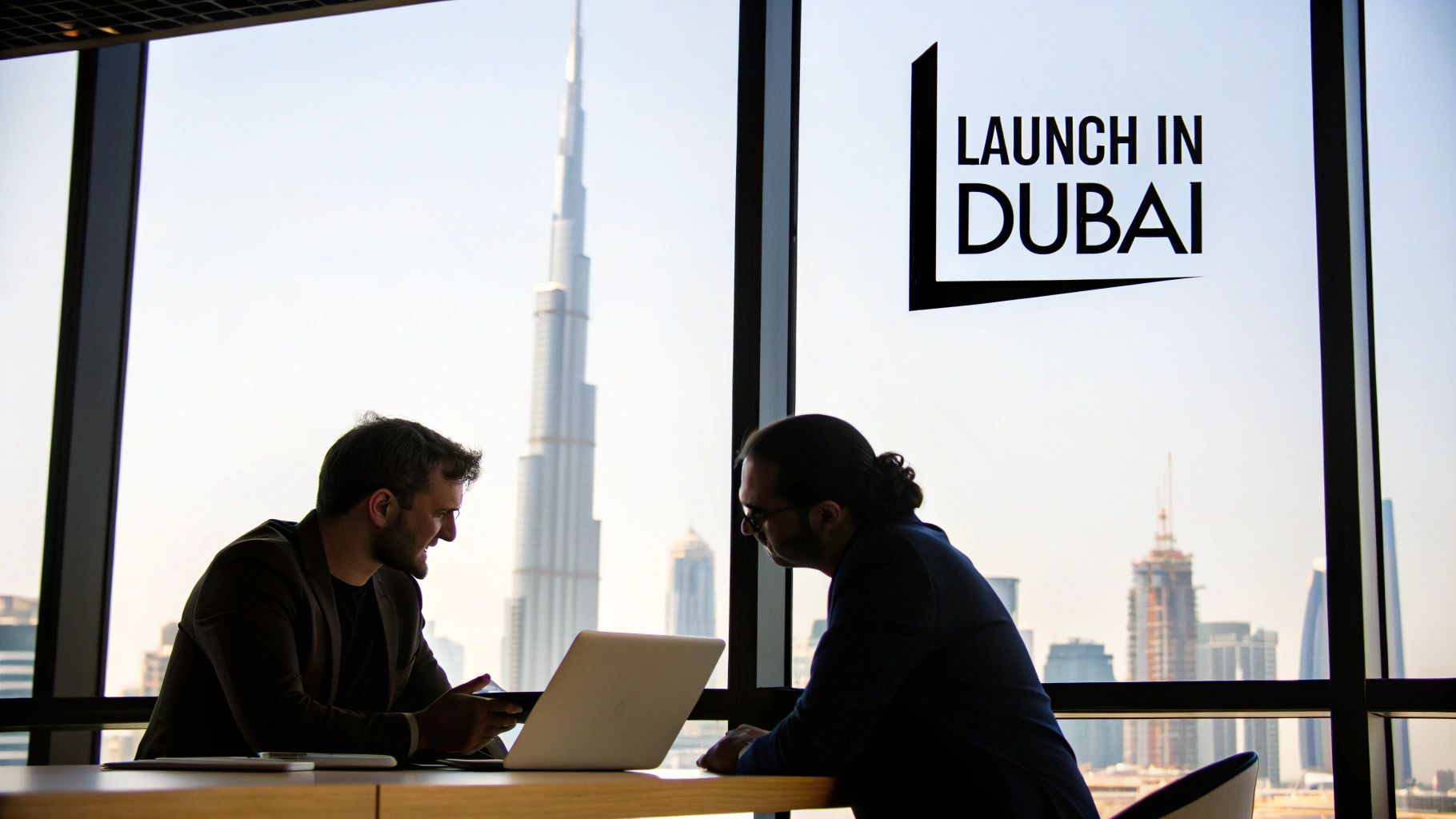
Why a Dubai Business License Is an Absolute Must
Obtaining a business license in Dubai is far more than just ticking a regulatory box—it's a powerful strategic asset. It officially legitimises your business, which is essential for opening a corporate bank account, sponsoring visas for your team and their families, and leasing a commercial office space.
Operating without one is simply not an option. You'd be working outside the law, risking serious penalties, and you would have zero credibility with potential clients, partners, and investors.
The type of license you choose also unlocks specific advantages. A Mainland license, for instance, gives you unrestricted access to the entire UAE market. On the other hand, a Free Zone license might offer 100% foreign ownership and attractive tax exemptions, making it perfect for international trade. The choice you make right at the start directly impacts your company's operational freedom and potential for growth.
A business license is the bedrock of your company's legal identity in the UAE. It determines who you can trade with, where you can operate, and the ownership structure you can have. Getting this first step right is critical for long-term success.
Key Things to Sort Out Before You Apply
Before you get lost in the paperwork, take a step back and think through these essential points. Getting clarity here will make the entire process much smoother.
- Your Business Activity: What, exactly, will your company be doing? The activities you define on your application will dictate the license type you’ll get—whether it's Commercial, Professional, or Industrial.
- Your Ownership Structure: Are you going it alone, or will you have partners? This is a huge decision, especially when deciding between Mainland and Free Zone setups, as the rules around ownership can vary significantly.
- Your Jurisdiction: Do you need to trade directly with the local UAE market? If so, you'll need a Mainland license. Or is your business focused on international clients and trade? In that case, a Free Zone might be the better fit. Your answer here is one of the most important decisions you'll make.
Dubai Business License Quick Decision Guide: Mainland vs Free Zone
Choosing between a Mainland and a Free Zone license is often the first major hurdle. It's a foundational decision that shapes your entire business structure. This table breaks down the core differences to help you see which path aligns better with your goals.
| Feature | Mainland License | Free Zone License |
|---|---|---|
| Market Access | Unrestricted access to trade anywhere in the UAE and internationally. | Primarily for international trade. Trading in the UAE mainland requires a local distributor. |
| Ownership | 100% foreign ownership is now available for most commercial and industrial activities. | 100% foreign ownership is a standard feature for all license types. |
| Office Space Requirement | A physical office space registered with Ejari is mandatory. | Flexible options, including flexi-desks and virtual offices, are often available. |
| Visa Eligibility | Visa eligibility is generally tied to the size of your physical office space. | Visa packages are often predetermined and included with the license, not dependent on office size. |
| Approvals | Requires approvals from the Department of Economy and Tourism (DET) and potentially other government bodies. | Approvals are managed by the specific Free Zone authority, which often simplifies the process. |
| Business Scope | Can take on government contracts and operate freely across the emirates. | Restricted to operating within the designated Free Zone or internationally. |
| Customs Duty | Standard customs duties apply to imported goods. | No customs duty on goods imported into the Free Zone for re-export. |
Ultimately, the right choice boils down to your specific business model. If your target market is the local UAE population and you plan to bid on government projects, a Mainland license is the clear winner. But if your focus is on international trade and you value streamlined setup and operational processes, a Free Zone is likely your best bet.
As you plan your launch, remember that securing a physical office is often a key requirement, especially for Mainland licenses. It’s a vital step in establishing a tangible presence. You can start by finding your ideal workspace that meets regulatory needs. For a more comprehensive look at the entire journey, you can also check out our in-depth guide on https://prodesk.ae/how-to-start-business-in-uae/.
Right, let's get into the nitty-gritty. Deciding on the right jurisdiction for your Dubai business licence is one of those foundational moments that will define your company’s trajectory. It’s not just a box to tick; it’s a strategic choice between operating on the Mainland or within a specialised Free Zone.
This single decision influences everything—your market access, ownership structure, and even your long-term tax situation. You're essentially choosing the legal sandbox your business will play in from day one.
A Mainland company gives you the ultimate freedom to trade directly with the entire UAE market, no strings attached. This is the path you want to take if your business plan involves selling goods or services across Dubai and the other emirates. It’s also your ticket to competing for those lucrative government contracts.
Free Zones, on the other hand, are economic powerhouses designed to pull in foreign investment. They roll out the red carpet with massive benefits like 100% foreign ownership, zero hassle repatriating profits, and exemptions from customs duties. This makes them a magnet for international trading companies, import/export businesses, and service providers with a global client list.
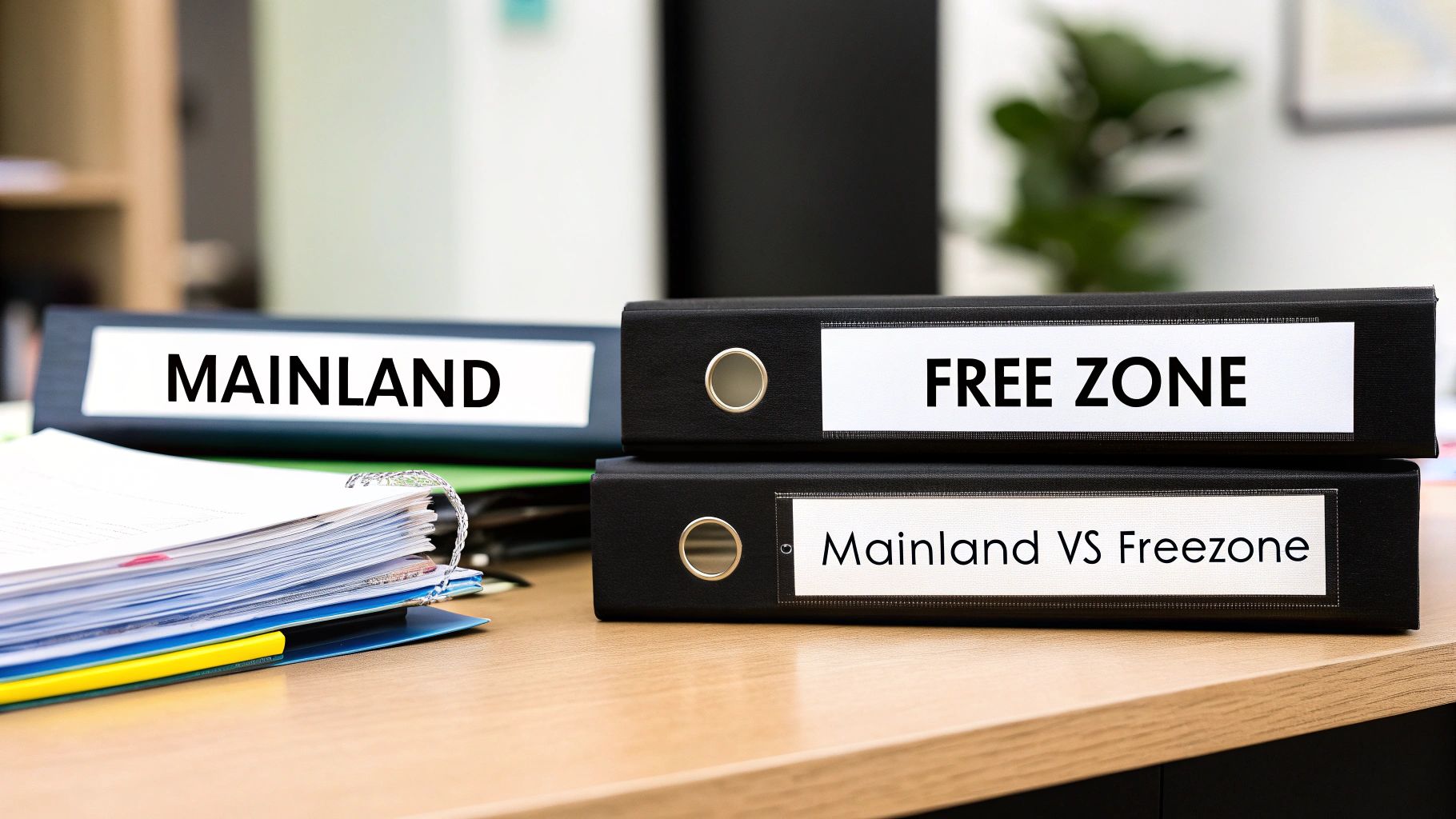
Mainland Licence: Your Gateway to the Entire UAE
A Mainland business licence, issued by the Department of Economy and Tourism (DET), is your key to the whole local economy. For years, this meant needing a local sponsor, but recent reforms have blown the doors wide open, now allowing 100% foreign ownership for over a thousand commercial and industrial activities.
This has been a game-changer, making the Mainland an incredibly appealing option for international entrepreneurs. It means you can set up a physical office, open a retail shop, or run a service-based business with total operational control and direct access to a buzzing domestic market.
And the market is definitely buzzing. As of January 2025, the UAE hit a new high with roughly 971,000 active commercial licences. Dubai is leading this charge, holding about 59% of that total—that's over 573,000 licences in the emirate alone. You can get more details on this incredible growth in this article about the UAE's record business licence numbers.
Free Zone Licence: Your Hub for Global Trade
Dubai boasts over 40 distinct Free Zones, each one a mini-ecosystem tailored to specific industries—think technology, media, commodities, and logistics. When you go for a Free Zone business licence, you're essentially setting up shop in a self-governed jurisdiction with its own set of rules.
The advantages are hard to ignore:
- Complete Foreign Ownership: You hold all the cards, with no need for a local partner.
- Tax Benefits: You get to enjoy 0% corporate and personal income tax, a major draw for any business.
- Profit Repatriation: Take 100% of your capital and profits back to your home country without any restrictions.
- Streamlined Setup: The whole formation process is typically faster and less bureaucratic than a Mainland setup.
The catch? Market access. A Free Zone company generally can't trade directly with the UAE Mainland. To do that, you'll usually need to team up with a local distributor. For a much deeper dive into the specifics, our guide on Dubai Free Zone company formation has all the details you’ll need.
This is a strategic fork in the road. Just ask yourself: "Is my main customer base inside the UAE or outside?" Your answer will point you straight to either a Mainland or a Free Zone setup.
Matching Your Business to the Right Licence Category
Once you’ve settled on a jurisdiction, the next puzzle piece is picking the right licence category. This has to align perfectly with what your business actually does. The three main types are Commercial, Professional, and Industrial. Getting this right is non-negotiable, as your licence legally defines what you can and can't do.
1. Commercial Licence
This is the most common licence out there. If your business is all about buying and selling goods, this is for you. It covers everything from general trading and retail to e-commerce and import/export. An entrepreneur planning to open a fashion boutique or an online electronics store would need a Commercial Licence. Simple as that.
2. Professional Licence
A Professional Licence is for businesses built on specialised, service-based expertise. This is for the consultants, artisans, lawyers, doctors, accountants, and IT wizards. The crucial difference is that your value comes from your intellectual or artistic talent, not from trading physical goods. A marketing consultancy or a software development firm are classic examples.
3. Industrial Licence
If you're actually making something—manufacturing, processing, or assembling goods—you'll need an Industrial Licence. This covers factories, workshops, and any kind of production facility. For example, a company that builds custom furniture or packages food products would require this licence. Be prepared for extra approvals, as you’ll need to comply with various ministry standards for safety and the environment.
The Essential Document Checklist for Your Application
Getting a business license in Dubai isn't about luck; it's about being meticulously prepared. Honestly, having every single document ready and correct before you even start is the best thing you can do to avoid frustrating delays. Think of it as building a solid foundation—get this part right, and everything else follows much more smoothly.
This is your definitive checklist. We'll go through everything, from the personal IDs for your shareholders to the business plan that sells your vision. Nailing this stage means your application sails through approvals, instead of getting bogged down in a back-and-forth of resubmissions.
Personal Documents for All Shareholders and Managers
First up, let's talk about the people. The authorities need to know exactly who is behind the business. That means verifying the identity and legal status of every single person involved, whether they're a shareholder, a director, or your appointed General Manager.
For each individual, you'll need to have these on hand:
- Clear Passport Copies: Make sure every passport has at least six months of validity left. This is a common trip-up.
- UAE Residence Visa Page Copy: This is only for shareholders or managers who are already UAE residents.
- Emirates ID Copy: A must-have for any UAE residents involved in the company.
- Passport-Sized Photographs: These need to be recent, professional, and on a white background.
It sounds simple, but you'd be surprised how many applications get initially rejected because of a blurry scan or an expired passport. Double-check every date and make sure each copy is perfectly clear.
The Business Plan: Your Blueprint for Success
Beyond who you are, the authorities want to see what you plan to do. A solid business plan is often required, especially if you're setting up in a Free Zone or need special external approvals. This isn't just a formality; it shows them you're serious and that your business idea is viable.
Your plan doesn't need to be a novel, but it should clearly cover:
- The specifics of your business activities.
- Your target market and how you'll reach them.
- A realistic overview of your financial projections.
- The background and experience of your management team.
A well-thought-out plan gives officials confidence that your venture is the real deal and has a genuine shot at succeeding in the Dubai market.
A common pitfall we see is treating the business plan as an afterthought. A vague or poorly researched plan is a major red flag for the authorities and can stop your application in its tracks. Invest the time to create a professional document that truly explains your vision.
Navigating Corporate Shareholder Requirements
What happens if one of your shareholders is another company? This introduces another layer of paperwork because the authorities need to verify the legal standing of that parent company. This is where document attestation becomes absolutely critical.
For any corporate shareholders, you’ll need a set of legalised documents from the company's home country. This usually includes:
- Certificate of Incorporation: Proof the company is legally registered.
- Memorandum of Association (MOA): Outlines the company's purpose and activities.
- Board Resolution: A formal document from the board authorising the new company setup in Dubai.
- Certificate of Good Standing: Confirms the company is compliant in its home country.
Each of these documents has to be notarised and attested first by the UAE Embassy in the country of origin, and then again by the Ministry of Foreign Affairs (MOFA) here in the UAE. It's a complex, multi-step process that can take a lot of time, which is why most people use a professional PRO service to handle it.
Scenario: A Tech Startup in a Free Zone
Let's make this real. Imagine an entrepreneur from the UK wants to launch a tech startup in a Dubai Free Zone. She has one corporate shareholder (her existing UK company) and one individual partner.
Here’s what her document checklist would look like:
- For the Individuals: Passport copies and recent photos for both partners.
- For the Corporate Shareholder: The UK company's Certificate of Incorporation and MOA. Both must be attested by the UAE Embassy in London and then by MOFA in the UAE. She'll also need a notarised Board Resolution.
- For the Business: The specific application form from her chosen Free Zone and a business plan detailing their software services.
A frequent mistake here is getting the attestation wrong. If those UK documents aren't legalised through the proper channels, the Free Zone will reject them immediately, sending her right back to square one. On a related note, if you are currently employed, you'll also need to understand the importance of an NOC. You can learn more about how to secure a No Objection Certificate in Dubai to make sure your transition is seamless.
Right, you’ve got your documents in a neat pile. Now comes the part where you officially engage with the authorities to bring your business to life. This is where you’ll deal with government departments, sort out your legal structure, and pin down a physical address for your company. If you navigate this path correctly, you’ll be holding your official Dubai business license before you know it.
Let's break this down into clear, manageable steps. From getting your company name approved to receiving that final licence, each action builds on the last, bringing you one step closer to opening your doors.
Kicking Off with Your Trade Name and Initial Approval
The first real step is to lock in your company's identity by reserving a trade name. You’ll do this through the Department of Economy and Tourism (DET) if you're setting up on the Mainland, or with the relevant authority for your chosen Free Zone.
Remember, your trade name has to be unique and follow UAE naming rules. That generally means no religious references or using names of companies that are already out there.
Once your name is approved, you’ll apply for Initial Approval. This is a big one. It's essentially a preliminary green light from the authorities, telling you they have no issue with your proposed business. This approval allows you to move on to the next stages, like drafting your legal documents and finding that all-important office space.
Think of it as the government's nod, confirming your business idea is viable and you can proceed with the formal setup.
The infographic below gives a great high-level view of how the documents flow during your application.
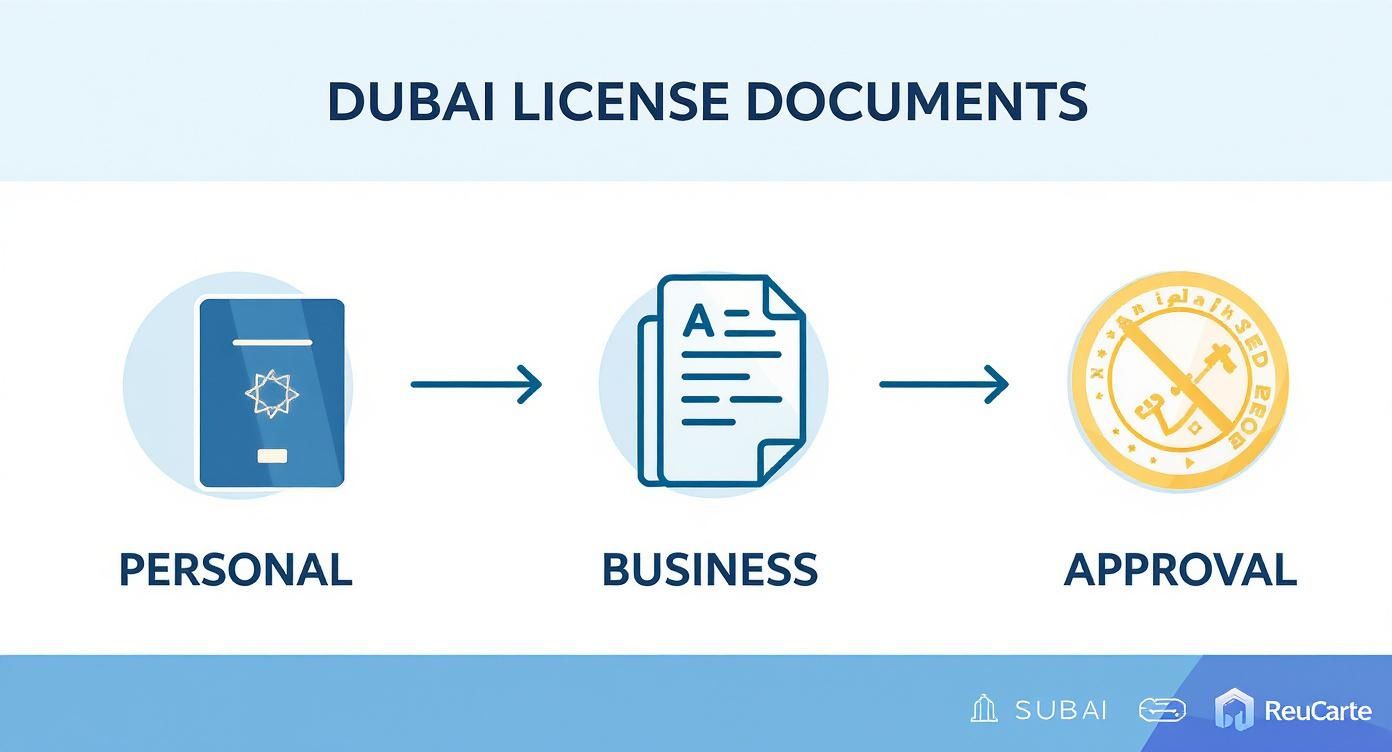
As you can see, the whole process relies on getting your personal, business, and approval paperwork sorted in the right order.
Drafting Your MOA and Securing an Office
With the initial approval in hand, your focus now shifts to your company's legal foundation and its physical home. You’ll need to draft and sign a Memorandum of Association (MOA) or, if you're a sole proprietorship, a Local Service Agent (LSA) agreement.
The MOA is a critical legal document. It spells out:
- The business's objectives and planned activities.
- How the share capital is split among partners.
- The management structure and who is responsible for what.
- The arrangements for sharing profits and losses.
This document isn’t just a piece of paper; it has to be notarised by a public notary in Dubai. For foreign investors, getting this professionally drafted is a must to protect your interests. It is, for all intents and purposes, your company's constitution.
At the same time, you have to find and secure a physical office space if you're getting a Mainland licence. This is non-negotiable. You’ll need to provide a registered tenancy contract, known as an Ejari, to the DET. This contract is your proof that you have a legitimate physical address for your business.
So many entrepreneurs gloss over the MOA. Please don't. This document is the legal backbone of your company, defining shareholder relationships and protecting your investment. Grabbing a generic template or rushing this step can cause massive headaches and disputes down the road.
The Role of External Approvals
Here’s a step that can catch people out. Depending on what your business actually does, you might need extra approvals from other government ministries or regulatory bodies on top of the standard DET or Free Zone permissions. If this isn't managed proactively, it can bring your application to a grinding halt.
For instance:
- A healthcare clinic needs a thumbs-up from the Dubai Health Authority (DHA).
- An engineering consultancy requires clearance from the Dubai Municipality.
- A restaurant or food trading business must get a permit from the Food Safety Department.
- A training institute has to get approval from the Knowledge and Human Development Authority (KHDA).
These external approvals often need to be worked on at the same time as your main license application. If you fail to get one, the whole process stops. This is where the experience of a professional corporate services provider really pays off. We know the specific requirements for hundreds of business activities and can handle these submissions efficiently, making sure nothing gets missed. This hands-on support is a core part of our cost-effective business setup solutions.
The good news is that the UAE government is always working to make this smoother. The business licensing landscape in 2025 is all about regulatory reforms and digital transformation to simplify things for entrepreneurs. E-licensing platforms and streamlined procedures are cutting down on bureaucracy and speeding up approvals. You can read more about the future trends in Dubai's business setup to see just how much the environment is improving.
Once all the approvals are secured, your documents are complete, and your office is registered, you’re ready to make the final payment to the authorities. After that, your official Dubai business license will be issued, and you can legally start operating in one of the most exciting economic hubs in the world.
Understanding Costs and Renewal Procedures
Budgeting for your business license in Dubai is about a lot more than just that first payment. To do it right, you need to understand both the one-time setup costs and the annual fees that keep you compliant. A solid financial plan from the get-go is key to a successful launch—the last thing you want is an unexpected bill derailing your momentum.
The total cost can swing wildly depending on where you set up (Mainland vs. Free Zone), your specific business activities, and even your company's legal structure. Think of it as a mix of government fees, third-party charges, and operational costs like office rent.
Breaking Down the Initial Setup Costs
When you first apply for your Dubai business license, you’ll run into a series of one-time fees. These are the foundational costs needed to get your company legally registered and ready to open its doors.
A typical breakdown of these initial expenses usually includes:
- Trade Name Registration: A fee to reserve and secure your unique company name.
- Initial Approval Fee: This is paid to the relevant authority (like the DET for Mainland) to get the preliminary green light for your business.
- Memorandum of Association (MOA) Fees: Covers the cost of drafting and notarising this critical legal document.
- License Issuance Fee: The main government fee for the license itself, which often changes based on your business activity.
- Office Rent and Ejari: For Mainland companies, this is a big one. You have to provide a registered tenancy contract, making it a significant upfront cost.
For example, an entrepreneur setting up a consultancy on the Mainland will need to budget for the DET license fee plus the annual rent for a physical office space. On the other hand, a tech startup in a Free Zone might pay a single package fee that bundles the license with a flexi-desk, making their initial outlay look quite different.
Annual Renewal: The Key to Staying Compliant
Getting your business license is a huge milestone, but it's not a one-and-done deal. To keep your business active and avoid some pretty hefty fines, you have to renew your license every single year. This is a non-negotiable part of maintaining your company’s legal standing in the UAE.
The renewal process involves submitting updated documents—like your renewed tenancy contract (Ejari) for Mainland companies—and paying the annual license fee. If you miss the deadline, you could be looking at penalties, getting your company blacklisted, or even having your corporate bank account frozen.
This is exactly why our Corporate PRO Services are so valuable to our clients. We handle the entire renewal process for you, making sure deadlines are met and all the paperwork is filed correctly. It gives you complete peace of mind to focus on what you do best: growing your business.
Beyond the License: Post-Setup Essentials
Once that license is in your hands, there are still a few more crucial steps to take. These post-licensing tasks are what make your business fully operational, and it's often where entrepreneurs need the most support.
- Opening a Corporate Bank Account: A business license is an absolute must-have for opening a corporate bank account in the UAE.
- Processing Visas: You'll need to apply for your own investor or employment visa, along with visas for any staff you hire.
- Registering with Relevant Authorities: Depending on your business, you might also need to register with immigration and labour departments.
These steps require careful coordination and a sharp eye for detail. As specialists in Golden Visa on Property and Investor Visa applications, we manage these procedures efficiently, ensuring you and your team can live and work legally in the UAE without any frustrating delays.
Thinking beyond the initial license fee is crucial. Budget for visa processing, bank account setup, and potential attestation services. These are the practical steps that turn your licensed company into a fully functioning enterprise.
The UAE's pro-business environment continues to draw in a massive number of entrepreneurs. Business license registrations have seen a sharp increase since 2023, with over 1.5 million active commercial licenses on record by late 2024. In 2024 alone, the UAE issued more than 200,000 new economic licenses, fuelling sectors like e-commerce and logistics thanks to government reforms. You can discover more insights about the increase in UAE business registrations on g-strohallegalgroup.com.
This growth just goes to show how important it is to have expert support to navigate the competitive landscape. With our 24/7 support and cost-effective solutions, we make sure your journey is seamless from start to finish.
Your Top Dubai Licence Questions, Answered
Starting a business in Dubai is an exciting journey, but it’s completely normal to have a lot of questions. Getting the right answers from the start is key to making confident, strategic decisions for your new venture.
We've been helping entrepreneurs set up their businesses across the UAE for years, and we've heard it all. So, let's dive into some of the most common questions we get and give you the practical, no-nonsense answers you need.
Can I Get a Business Licence Without Renting an Office?
Yes, you absolutely can, but it really depends on where you set up and what your business does.
Many free zones are built for modern businesses, especially startups and freelancers who don't need a traditional office. They offer clever solutions that tick the official boxes, like:
- Flexi-desks: This gives you access to a shared workspace and a legitimate business address without the cost of a private office.
- Virtual offices: Perfect for remote businesses, this option provides a registered address and mail handling services, but no physical desk.
On the other hand, if you're setting up on the Mainland, a physical office with a registered tenancy contract (Ejari) is almost always a must. It's often a non-negotiable requirement for certain business activities and is essential if you plan on sponsoring a larger team with employment visas. The best choice really comes down to how you plan to operate.
How Long Does It Take to Get a Business Licence in Dubai?
The timeline can vary quite a bit. For a straightforward free zone application where all your documents are in perfect order, the process can be incredibly quick—sometimes just a few working days.
A Mainland licence, however, is a different story. You're typically looking at anywhere from one to four weeks. The process has more steps, especially if your business requires special approvals from other government bodies like the Dubai Health Authority or the Municipality.
Honestly, the most common delays we see are almost always preventable. It usually comes down to small mistakes—incomplete paperwork, documents that haven't been properly attested, or a trade name that gets rejected. Working with someone who knows the system ensures your application is right the first time, which makes a huge difference in how quickly you get approved.
What Is the Real Difference Between Mainland and Free Zone?
This is probably the most important question you'll ask, and the answer boils down to two things: market access and ownership.
A Mainland company gives you the freedom to trade directly with any customer anywhere in the UAE. It also allows you to bid on valuable government contracts. Thanks to recent reforms, 100% foreign ownership is now possible for most activities, making it a fantastic option for businesses focused on the local market.
A Free Zone company is geared more towards international trade. You're guaranteed 100% foreign ownership, plus you get major tax benefits like 0% corporate tax and the ability to send all your profits home. The trade-off is that you're generally restricted to doing business within your free zone or internationally. If you want to sell directly to customers on the mainland, you'll usually need to go through a local distributor.
Choosing between Mainland and a Free Zone is the foundational decision for your business here. Whether you need the open market access of the Mainland or the tax advantages of a Free Zone, getting expert advice is the best first step.
At PRO Deskk, we do more than just process paperwork; we build the foundation for your success in the UAE. From Mainland and Freezone formation to securing Investor Visas and managing all your corporate PRO needs, we offer end-to-end support with a 24/7 commitment. Let us handle the complexities so you can focus on growth.
✅ Specialists in Mainland Company Formation in Dubai, Sharjah & Abu Dhabi
✅ Specialists in Freezone Company Formation across the UAE
✅ Specialists in Golden Visa on Property and Investor Visa
✅ Specialists in Corporate PRO Services and Attestation Services
✅ 24/7 Support Service – Always here when you need us
✅ Cost-Effective Business Setup Solutions tailored to your needs
✅ Enjoy UAE Tax Benefits for International Entrepreneurs
📞 Call Us Now: +971-54-4710034
💬 WhatsApp Us Today for a Free Consultation at https://prodesk.ae.

